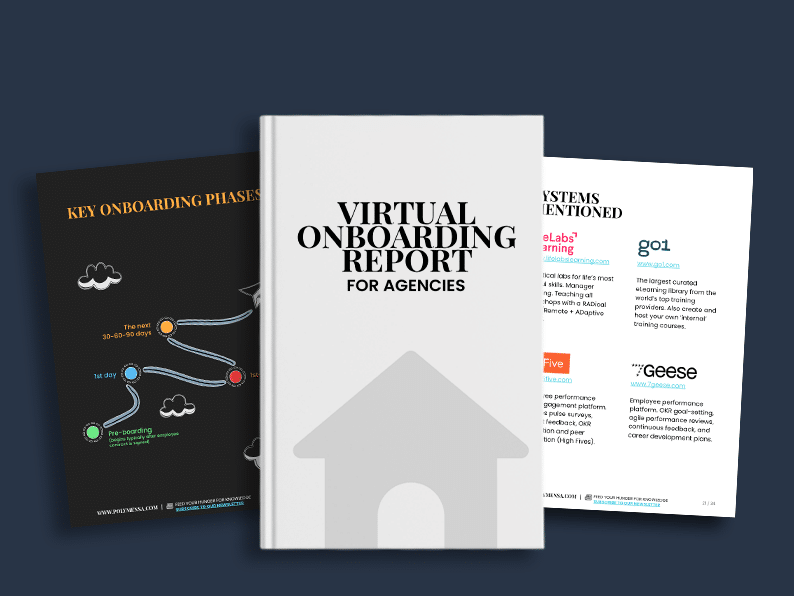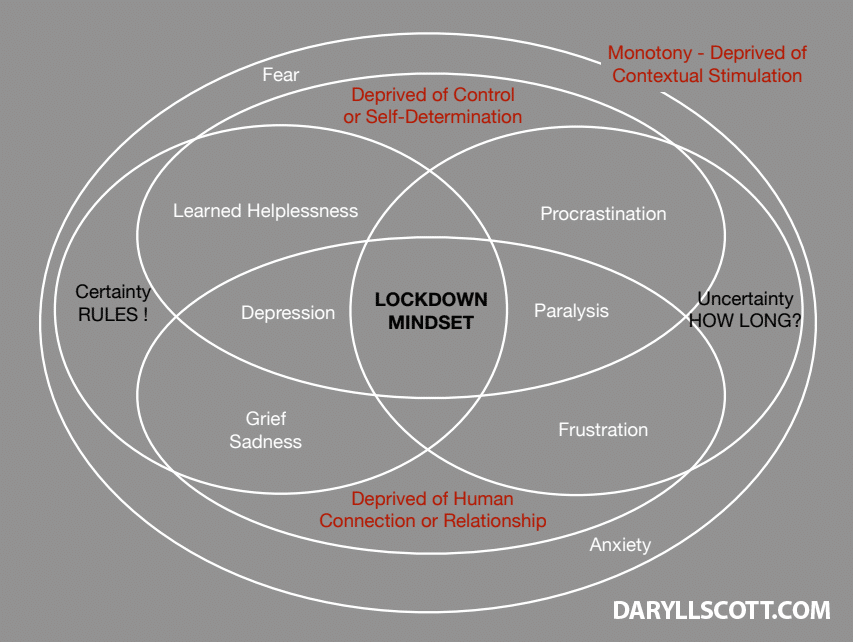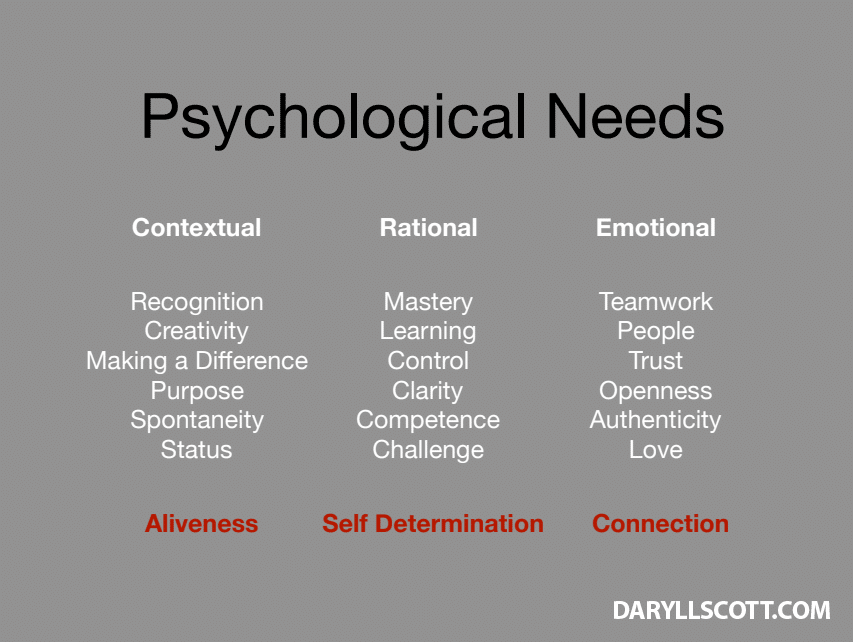
Reflections Jan 2021 – Week 1: Are you thinking too much about your ‘why’? What is drive? When is a lie a good lie and more…
January 11, 2021
We researched 41 progressive companies on their virtual onboarding of new hires
February 6, 20212020 in one image
Human systems coach and consultant - Daryll Scott - and people engagement expert - Mark Harland (Form) joined one of our teams at Polymensa recently to talk about how to help agency teams keep their morale up during the COVID19 pandemic. A lot of the agencies involved were deeply concerned about the well-being of their employees.
Here is a write up of the two sessions and the remote working mental wellbeing tips.
‘Always on’ culture
Daryll touched upon the matter that there is an unspoken rule right now of “get back to me as soon as possible” - an implicit expectation. Team members often feel they need to be ‘online’ or ‘visible’ to prove they are working.
The area this is manifested most in our personal lives is with our phones. For example when you send a person a message on Whatsapp and they’ve seen it - indicated by the blue ticks (if activated) - the immediate question most of us have is: “Why hasn’t this person responded yet”?
We experience this feeling, because when we speak to someone in person even a silence of a few seconds makes most people feel uncomfortable - even more extreme insecure.
A solution to mitigate this behaviour is to have a clear rule in the team, lead and advocated by the founder of your agency e.g.
- No expectations on immediate responses on Slack, Teams, emails - unless urgent.
- If urgent, pick up the phone and call your team member.
- Notifications are to be turned off - and that’s OK.
- People do not have to be ‘visibly online’
- Celebrate a break of the current norm e.g. walk through the park, a yoga session in the garden, etc.
Unplanned communication
Daryll quoted a piece of research which stated that almost all planned communication such as ‘big company strategy presentations’ are forgotten by everyone in your agency. Whereas it is all the ongoing informal communication that sticks with people.
With the current way our days are structured and planned, think about how can you build in informal communication without it feeling contrived? One participant in the session suggested the idea of doing ‘walk and talks’ phone calls rather than Zoom calls - these encourage a different way of listening and talking.
Leaders and team member responsibility to support each other
A study showed that if you swap out one leader for another it takes about a week for the team to change behaviours based on the expectations of the leader. It is an ongoing search for belonging and feeling appreciated.
The more ‘prominent’ your role in the organisation the more eyes are on you. Unintentional behaviour becomes a real problem. You might do something and think, ah that’s fine, no one will notice - chances are someone will notice and it will impact that person. Leaders have to be aware of this all the time and it is key they constantly work on improving their leadership skills.
However, the challenge with that is this puts immense pressure on leaders to constantly perform. But we are humans and that’s an unrealistic expectation. How can your agency build openness both ways? If you're a junior team member you need help with certain things, just as much as the most senior person in the business.
3 key areas of human systems
Simplified these 3 key areas are:
- The world around us and everything that happens in our environment
- How do we feel about it?
- How do we choose to feel about it?
Monotony - deprived of contextual stimulation

The lack of serendipity and spontaneity currently is immense. Asking someone to jump on a quick call or go for a coffee (if allowed) is often responded with a “what now?”
Yet it is that rigid planning of our day that is preventing us from feeling alive at the moment. And it has the potential to cause real emotional worries for us.
How can you add spontaneity into your workday, without it feeling forced?
How can you add spontaneity back into your personal life?
The last time when you went for a walk, did you walk the same way you always walk? Go down a new path you haven’t explored before. Get lost for a bit.
An exercise for every person in the team
The last time when you went for a walk, did you walk the same way you always walk? Go down a new path you haven’t explored before. Get lost for a bit.
- Take a moment write down 3-5 items using a few words only to answer the following questions:
a. What is important to you at work?
b. What do you need for you to feel great at work? - Study and discuss the following slide

- Now think about how can make a positive change in each one of the key three areas of:
a. Aliveness
b. Self determination
c. Connection
We are all carrying the symptoms of dealing with loss
Mark rightly pointed out that we have lost a lot of things in our life this year. Simple things such as free roaming without worry, going to a pub, a restaurant, an art gallery, hanging out with friends and family without feeling like you are breaking the law or endangering anyone, the list continues.
What we forget is that the feelings we are experiencing are no different to the feeling of loss we may have experienced in the past. As such we are grieving and sometimes reacting in psychologically regressive ways e.g. dealing with our emotions like a teenager might - erratic and irrational.
The problem is that we are dealing with what has been termed as “ambiguous loss”. A loss without closure. We don’t know when this pandemic will end and when things will return to normality.
That makes it hard to apply some of the models that exist to deal with grief such as:
The Four Trajectories Of Grief and Trauma Reactions
Instead you end up in a continuous loop of trying to find answers. That is draining.
Problematic stretch targets
Mark advised to cut down on stretch targets - goals that are almost near impossible to achieve. These can be aspirational, but in the current climate not advisable. Instead provide your teams with shorter targets. Goals that provide a sense of direction and achievement.
3 areas of improvements
While working with various agencies, Mark has experienced 3 areas of improvement.
- Put a punctuation in the endless sentence. What immediate actions can be taken to improve the situation and focus on the things that are in your control. Set a period.
- Connect with your values again. It’s the best time to revisit your values and make sure you are living by them again.
- Change the narrative. Rather than continuously repeating the bad news. Label it once, as it is the reality we are facing, but how can we ensure as a team we are moving out of this well. Work together with your team to come up with solutions.
The vulnerable/relatable leader
Mark spoke about the word ‘love’ in the business, which probably means many things to many different people. In his definition and in the business context: Love is you extending your boundaries at the benefit of another person and at your cost. Mark shared a story from a client of his who every week in a brief email shares how he is currently feeling, what effect it is having on his personal life at home, at work. The email is not a ‘how is the business doing’, it’s a ‘how am I doing’ message. That level of openness has had a positive impact on the entire team’s morale.
PPE for your business
What are you doing to protect your business right now? Not PPE as such. But are you continuing to provide learning and development opportunities for team members. Opportunities to socialise - uncontrived. Opportunities to team up with others in the business to solve problems together.
4 things all team members want
To be seen.
To be known.
To be accepted.
To be loved.
Recommended further reading
Who is responsible for employee engagement? Bain & Co report
Neuro Design - Darren Bridger - for those interested in neuro marketing





